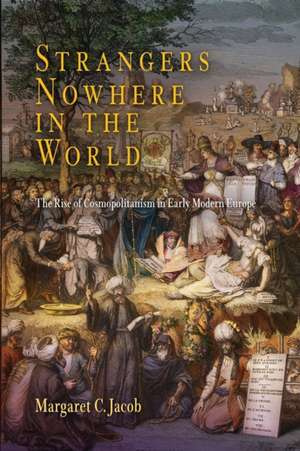Strangers Nowhere in the World – The Rise of Cosmopolitanism in Early Modern Europe
Autor Margaret C. Jacoben Limba Engleză Paperback – 4 dec 2016
Jacob investigates what it was to be cosmopolitan in Europe during the early modern period. Then--as now--being cosmopolitan meant the ability to experience people of different nations, creeds, and colors with pleasure, curiosity, and interest. Yet such a definition did not come about automatically, nor could it always be practiced easily by those who embraced its principles. Cosmopolites had to strike a delicate balance between the transgressive and the subversive, the radical and the dangerous, the open-minded and the libertine. Jacob traces the history of this precarious balancing act to illustrate how ideals about cosmopolitanism were eventually transformed into lived experiences and practices. From the representatives of the Inquisition who found the mixing of Catholics and Protestants and other types of "border crossing" disruptive to their authority, to the struggles within urbane masonic lodges to open membership to Jews, Jacob also charts the moments when the cosmopolitan impulse faltered.
Jacob pays particular attention to the impact of science and merchant life on the emergence of the cosmopolitan ideal. In the decades after 1650, modern scientific practices coalesced and science became an open enterprise. Experiments were witnessed in social settings of natural inquiry, congenial for the inculcation of cosmopolitan mores. Similarly, the public venues of the stock exchanges brought strangers and foreigners together in ways encouraging them to be cosmopolites. The amount of international and global commerce increased greatly after 1700, and luxury tastes developed that valorized foreign patterns and designs.
Drawing upon sources as various as Inquisition records and spy reports, minutes of scientific societies and the writings of political revolutionaries, Strangers Nowhere in the World reveals a moment in European history when an ideal of cultural openness came to seem strong enough to counter centuries of chauvinism and xenophobia. Perhaps at no time since, Jacob cautions, has that cosmopolitan ideal seemed more fragile and elusive than it is today.
Preț: 189.78 lei
Nou
Puncte Express: 285
Preț estimativ în valută:
36.33€ • 37.36$ • 30.14£
36.33€ • 37.36$ • 30.14£
Carte tipărită la comandă
Livrare economică 18 februarie-04 martie
Preluare comenzi: 021 569.72.76
Specificații
ISBN-13: 9780812223873
ISBN-10: 081222387X
Pagini: 200
Dimensiuni: 160 x 226 x 12 mm
Greutate: 0.34 kg
Editura: MT – University of Pennsylvania Press
ISBN-10: 081222387X
Pagini: 200
Dimensiuni: 160 x 226 x 12 mm
Greutate: 0.34 kg
Editura: MT – University of Pennsylvania Press
Cuprins
Notă biografică
Margaret C. Jacob













